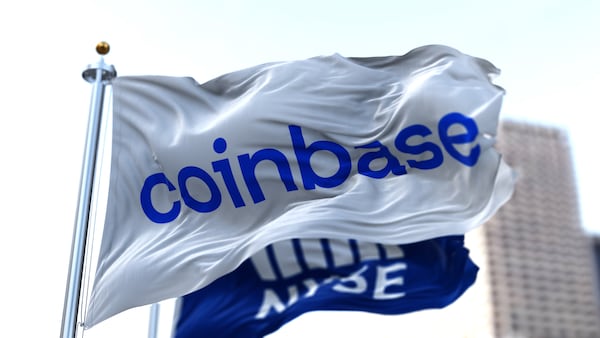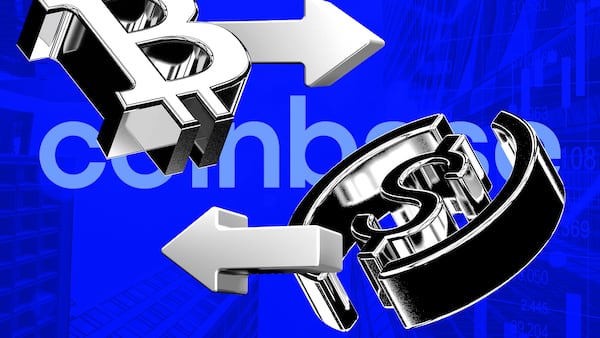- BiT Global alleged Coinbase unlawfully delisted wBTC.
- Coinbase didn't like Justin Sun's undefined role at the issuer.
- The antitrust lawsuit in San Francisco breaks new legal ground.
A couple of months ago, a Coinbase team made a big call — it decided to delist a version of Bitcoin that runs on Ethereum, a cryptocurrency the exchange had offered customers since 2020.
Why the sudden change?
According to court documents, Coinbase suspected that Justin Sun, the billionaire founder of the Tron blockchain, exerted “potential control” over so-called wrapped Bitcoin, or wBTC.
Sun’s role was a dealbreaker, they decided.
“He has repeatedly been accused of, investigated for, and sued for financial misconduct,” attorneys for Coinbase wrote in court papers. “Reports of his alleged misdeeds abound in the press and crypto community more broadly.”
Crying foul
Up until late last year, Coinbase didn’t have an issue with wBTC. That changed after its original issuer, BitGo, made a deal with Sun and Hong Kong-based custodian BiT Global.
For Coinbase, Sun’s undefined role violated the “safety and legality” standards it employed to vet the 271 cryptocurrencies available for trading on its platform.
But BiT Global cried foul.
In a lawsuit filed in federal court in San Francisco on December 13, the venture accused Coinbase of abusing its market power and dumping wBTC in favour of listing its own version of wrapped Bitcoin.
As a result, BiT Global said wBTC’s circulating supply had slid 5%, a loss of hundreds of millions of dollars.
In a surprising move that set the crypto legal community abuzz, BiT Global invoked a 135-year-old law used to break up Gilded Age monopolies such as Standard Oil — the Sherman Antitrust Act.
Coinbase, which denied the allegations in court papers, declined to comment on the litigation and directed DL News to posts made on social media by its chief legal officer.
Representatives for Sun, who is not a party in the case, did not respond to DL News’ requests for comment.
‘In the case of wrapped Bitcoin, Coinbase viewed it as just another cash grab.’
— BiT Global lawsuit
The lawsuit apparently marks the first time a blockchain venture has used the Sherman Antitrust Act in commercial litigation, crypto lawyers say.
“Private antitrust lawsuits have finally arrived in crypto,” Bill Hughes, senior counsel at Consensys and a former Department of Justice attorney, wrote on X.
So, too, has the issue of market dominance.
“Crypto is very focused on distributing power — from larger, concentrated entities to, at least, more entities or to individuals,” Orlando Cosme, a crypto lawyer, told DL News.
“That’s the ethos of the space, yet in a lot of different markets, you do see concentrated power, whether it be Coinbase and Binance or Uniswap.”
First target
The case could pull back the curtain on how Coinbase decides which cryptocurrencies get listed, or delisted, from a platform that handles about $8 billion in daily trading volume.
Coinbase axed wBTC three months after it launched its own competing product: cbBTC, which now has a market value of $2.4 billion.
BiT Global suggested this isn’t a coincidence.
“Like all the centralised tech giants before it, Coinbase gives lip service to the innovation of a decentralized world,” BiT Global attorneys wrote.
“It has now embarked on an effort to use that power to replace cryptocurrencies created by others with its own knock-off versions, and wBTC is Coinbase’s first target,” they argued.
Nonsense, said Coinbase lawyers.
In the documents, they contend Coinbase faces “robust” competition from other exchanges in the US. Moreover, they said Coinbase handled less than 1% of all wBTC trading volume, most of which occurred on Binance and Uniswap, a blockchain-based exchange.
‘Coinbase should be able to enforce its listing standards, which protect its customers from fraud and actors like Mr. Sun.’
— Coinbase court filing
Coinbase prevailed in the first legal skirmish when a federal judge declined to grant BiT Global’s request to stop wBTC’s delisting.
“BiT Global does intend to prove the case through trial. It is not dropping the suit,” Cyclone Covey, a lawyer at Kneupper & Covey representing the company, told DL News.
Sun’s role
Hovering over the suit is Sun, a crypto mogul who recently made headlines for spending $6.2 million on a piece of conceptual art that featured a banana duct-taped to a wall. He then livestreamed himself eating it.
The day after BiT Global sued Coinbase, Paul Grewal, the exchange’s chief legal officer, challenged Sun to discuss “safety and legality” standards for listed cryptocurrencies.
“I look forward to your deposition under oath in California,” Grewal said on X. “No need to bring a banana.”
Sun said he would be happy to learn more. “Btw: I’m not directly involved in this case, just a bit curious,” he tweeted.
Happy to learn what exactly “safety and legality” mean in the context of the WBTC case? Btw: I’m not directly involved in this case, just a bit curious. https://t.co/CudOHLA9M0
— H.E. Justin Sun 🍌 (@justinsuntron) December 14, 2024
Coinbase wasn’t the only organisation that got nervous about Sun’s involvement with BiT Global and wBTC.
In September, a risk advisor at Sky, the DeFi protocol formerly known as Maker, briefly recommended dumping wBTC as stablecoin collateral due to Sun’s involvement, according to posts on the protocol’s governance forum.
Wrapping Bitcoin
Offerings such as wBTC make it possible to move Bitcoin onto more performant blockchains such as Ethereum.
Users “wrap” their Bitcoin by handing it over to a custodian, such as BiT Global. The custodian then mints a new token on Ethereum. The “wrapped” Bitcoin is instantly redeemable for the Bitcoin held in custody, and, as such, trades at par with that Bitcoin.
That makes it possible to, say, use one’s Bitcoin as collateral when taking out a loan on an Ethereum-based lender, like Aave.
While there are many kinds of wrapped Bitcoin, wBTC is the most popular, with a market value just over $13 billion, according to data compiled by crypto asset manager 21.co.
In August, BitGo, the original issuer of wBTC, announced it was entering into a joint venture with BiT Global that would improve the cryptocurrency’s security by splitting custody of the underlying Bitcoin between the two companies.
But the press release mentioned another partner.
“This is a strategic partnership between BitGo, Justin Sun, and the Tron ecosystem,” said the release.
Coinbase pressed BiT Global for details of Sun’s role at BiT Global and potential control of wBTC. Yet the company said that BiT Global didn’t fully address those questions.
“BiT’s evasiveness exacerbated doubts,” Coinbase said in court papers.
BiT Global lawyer Covey told DL News that the company responded to every Coinbase inquiry completely and in a timely manner.
‘Effective control’
Even as Coinbase was trying to learn more about Sun’s role, BA Labs, a risk advisor at Sky, the DeFi protocol, was asking questions of its own.
BA Labs found it “highly likely” that Sun had “effective control” over BitGlobal, according to a post published in September.
“Justin Sun affiliated stablecoins and custodial products have a significant negative track record and pose elevated counterparty risk,” BA Labs said.
BA Labs eventually withdrew its recommendation that Sky ditch wBTC after receiving assurances that BiT Global did not have total control over the coin.
In its lawsuit, BiT Global confronted Coinbase’s argument about standards by arguing that the exchange had no problem listing memecoins such as PEPE, WIF, and MOG.
Memecoins are highly volatile and can blindside users with dramatic price swings, leaving once-triumphant investors penniless in seconds. They are explicitly and defiantly useless.
MOG, for example, informs users that it has no value and “is to be used strictly for getting laid,” BiT Global said.
“Coinbase’s decision to list Mog just two weeks after delisting wBTC demonstrates that the decision had nothing to do with standards, and everything to do with unfairly and fraudulently pushing wBTC out of the market,” BiT Global attorneys wrote.
Not true, Coinbase said.
“It is common sense that Coinbase should be able to enforce its listing standards, which protect its customers from fraud and actors like Mr. Sun,” the exchange said in court papers.
Depositions
Now, crypto lawyers are closely watching what happens next in this novel case.
On Tuesday, Coinbase asked judge Araceli Martínez-Olguín to toss the lawsuit.
BiT Global never alleged “even the most basic requirements for an antitrust claim,” according to Coinbase. Bit Global’s response is due February 4. Martínez-Olguín will hear arguments from both sides in April.
BiT Global is going to have a hard time proving Coinbase had ulterior motives for delisting wBTC, said Cosme, the crypto lawyer.
“All their allegations are very speculative,” he said.
Then again, if the case survives Coinbase’s effort to get it dismissed, BiT Global may be able to force Coinbase to turn over evidence on why wBTC was delisted.
That may entail seeking depositions of key executives.
And Coinbase could seek the same from the BiT Global side, including Justin Sun.
Update: This story was updated on January 22 to report details Coinbase’s motion to dismiss the lawsuit.
Aleks Gilbert is DL News’ New York-based DeFi correspondent. You can contact him at aleks@dlnews.com.









